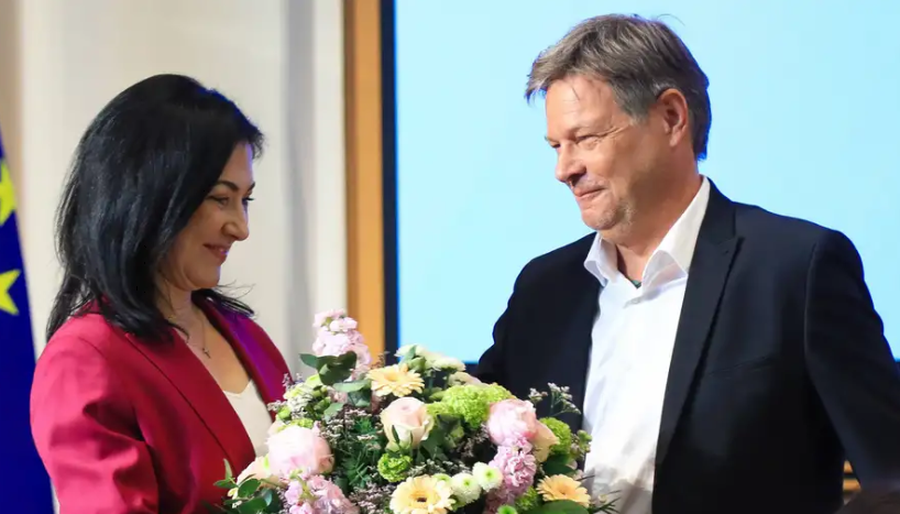
Economy Minister Reiche aims to provide the necessary energy with thermal power plants and gas, and less with heat pumps. Climate activists are sharply criticizing this approach.
When CDU Economics Minister Katherina Reiche took over from former minister Robert Habeck two weeks ago, she spoke warmly of the environmentalist politician. This was a surprise, because Habeck had been the target of fierce attacks from the Christian Democrats during the election campaign. For example, CSU leader Markus Söder repeatedly called him "the worst economics minister of all time."
But Reiche recalled that Habeck managed to secure energy supplies in response to the energy crisis in Germany after the pandemic and the start of the war in Ukraine: "I would like to thank you for this almost superhuman effort."
She added that Habeck had contributed to the country's recovery from the crisis and that he had also taken "unpopular measures." The Economy Ministry staff applauded for a long time, and Habeck was moved.
Reiche aims to repeal Habeck's most important law
Meanwhile, Reiche is working to change Habeck's most important law: the "Building Energy Act", which the people call the "Heating Act". After all, the coalition agreement with the Social Democrats clearly provides for the repeal of this law. As minister, Habeck tried to eliminate the weakness of German climate policy - while the construction of renewable energy sources is progressing, Germans are still heating themselves with gas that harms the atmosphere. That is why he legally forced the installation of heat pumps and tried to set a deadline for the lifespan of gas heating systems. Germans received this with disapproval, while the Greens were accused of wanting to dominate even basement heating installations.
Reiche wants to change the law that requires the renovation of gas heating systems installed before 1991 and repeal this provision. At the same time, the introduction of heat pumps, after initial difficulties, is now making good progress. In the first months of this year, sales increased by 35 percent to a total of 62,000 units.
Martin Zabel, the manager of the Federal Heat Pump Association, says he sees "light at the end of the tunnel" as the 70 percent state subsidy has now "stabilized" and annual sales of 260,000 pumps are expected. Habeck has set a target of 500,000 new pumps per year by early 2022. Zabel believes the positive trend in the market is the result of growing awareness that replacing fossil energy sources makes sense.
Minister Reice announced that in the new German government, in addition to climate protection, energy security has an absolute priority and that this includes the construction of new gas-fired power plants. Gas is certainly less harmful to the climate than coal, which Germany wants to phase out by 2038.
Coal currently provides 20 percent of Germany's electricity. That's why the previous government was in favor of building gas-fired power plants, but not to the same extent as Reiche.
Are the minister's plans "exaggerated"?
Renowned energy expert Claudia Kehmfert from the Institute for Economic Development (DIW) told German media that the new minister's plans were "completely exaggerated." She said there are alternatives in hydroelectric power, creating flexibility in the system and large batteries for energy storage. And Greenpeace climate change expert Martin Kaiser told DW that Germany must finally break the fossil energy supply chain and become independent of imports by building up renewable sources faster. According to him, Reiche is going in the opposite direction, increasing dependence on fossil fuels.
However, the new Chancellor Friedrich Merz wanted to raise money for a special fund to finance the reconstruction of Germany's infrastructure. The constitution did not allow such borrowing, and a two-thirds majority in the Bundestag was needed to change this constitutional provision.
To secure the necessary votes, the Greens, who were already out of power, also needed support. They negotiated skillfully with the Christian Democrats. The constitutional provision was changed, and Germany managed to create a special fund with an additional 500 billion euros for the new government's ambitious plans. But the price of the Greens' support for a two-thirds majority in the Bundestag was – 100 billion euros, or a total of one fifth of the special climate protection fund.
Since the powers of the Ministry of Economics were strengthened, the Ministry of the Environment was left with only responsibility for international climate protection. The new Social Democratic Minister Carsten Schneider is not in the spotlight at the moment.
Martin Kaiser believes that the new minister rightly considers climate policy to be part of international security policy and that Schneider should strengthen global climate protection despite Trump.
However, the question is whether he will be able to impose his concepts on the German government, next to a strong Minister of Economics like Reiche./ DW (A2 Televizion)











